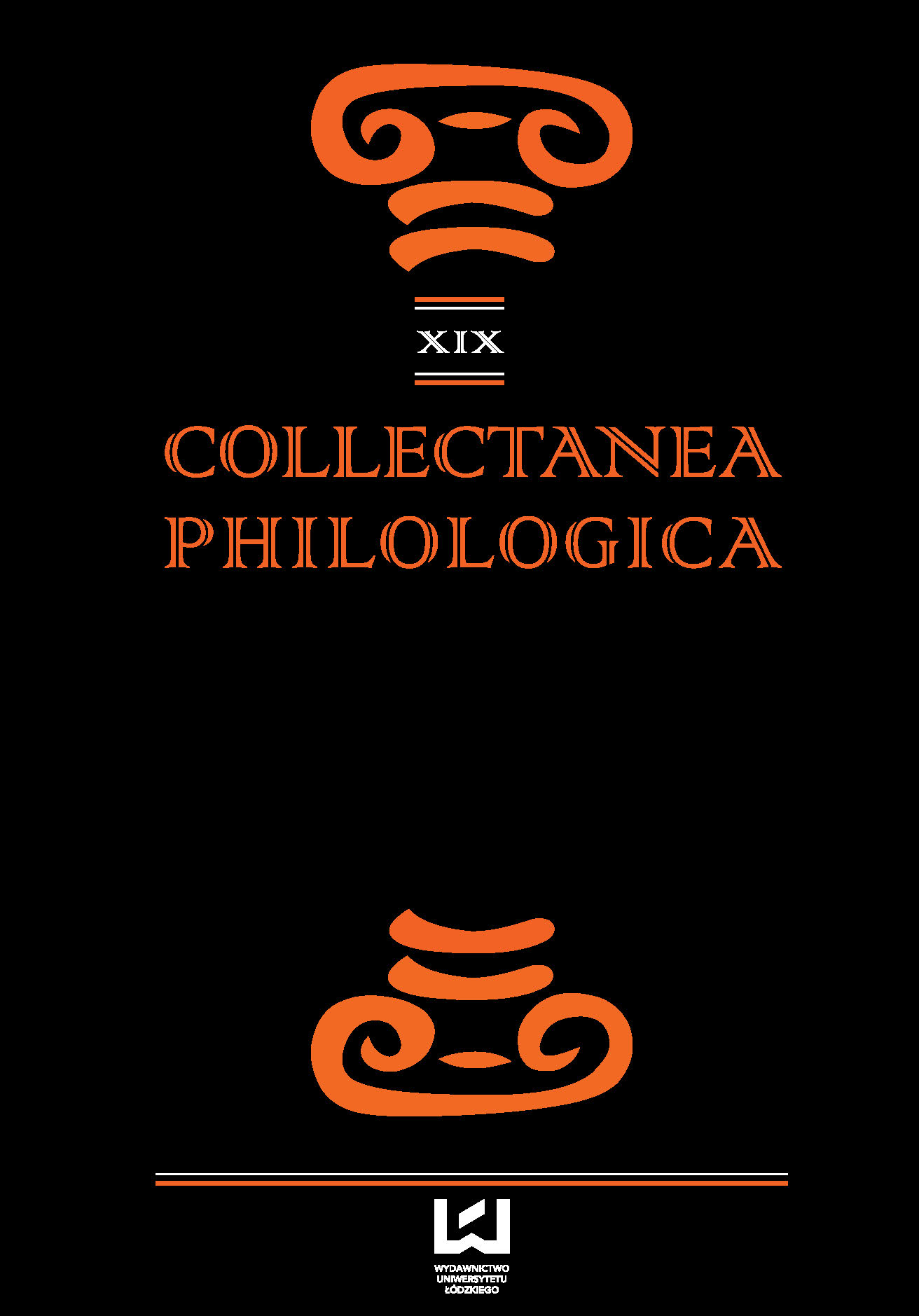Myths of Ancient Greece and Rome in didactics
DOI:
https://doi.org/10.18778/1733-0319.19.12Słowa kluczowe:
Mythen der Griechen und Römer, Didaktik, Lateinunterricht, griechische und römische KulturAbstrakt
In text below the author would like to take this opportunity to raise the issue of the possibility of presenting during Latin lessons wide range of information relating to the myths and legends of Ancient Greece and Rome. A lesson dedicated to the Olympian gods will serve as an example of such practice. This lesson will provide a starting point for students and it will enable them to meet the fascinating world of history and culture of the classical antiquity. This article will start with presentation of the most important information about the polish school ‘gimnazjum’ and the curriculum of the Latin language in this school. Then some formal issues connected with conducting the discussed lesson will be highlighted. Afterwards the original lesson plan will be discussed. During the lesson the selected canon of Greek and Roman myths will be presented and then enriched by multimedia presentation and additional exercises. In addition to this both the lesson objectives and teaching methods and forms of work will be shown. Nowadays, very important matter is that all of this should be achieved in a friendly manner and at the same time it should be clear and understandable for pupils, who take Latin classes. This is a real challenge, it is a really difficult task to gain interest of those young people, who are accustomed or even addicted to the use of the Internet, in the language such as Latin. In addition, the author would like to show the pupils the timeless value of myths and legends of the classical antiquity and draw their attention to rediscover the power of classical myths, symbols and concepts in the 21st century.
Bibliografia
Council of Europe. 2004. Common European Framework of Reference For Languages: Learning, Teaching, Assesment, Strasbourg: Language Policy Unit. Work available online: https://www.coe.int/t/dg4/linguistic/Source/Framework_EN.pdf, (accessed 10 October 2015).
Google Scholar
Flaccus, Q.H.. 1986. Dzieła wszystkie. Tom I: Ody i epody. Ed. by Oktawiusz Jurewicz. Warszawa Ossolineum.
Google Scholar
Grant, M.. 1993. Mity rzymskie. Trans. by Zygmunt Kubiak. Warszawa: Państwowy Instytut Wydawniczy.
Google Scholar
Graves, R. 1992. Mity greckie. Trans. by Henryk Krzeczkowski. Warszawa: Państwowy Instytut Wydawniczy.
Google Scholar
Griffiths, W. 2008. ‘Increasing access to Latin in schools’. In Meeting the Challenge, International Perspectives on the Teaching of Latin, edited by Bob Lister, 71–90. Cambridge, Cambridge University Press.
Google Scholar
Grimal, P. 1987. Słownik mitologii greckiej i rzymskiej. Trans. by Jerzy Łanowski. Wrocław: Ossolineum.
Google Scholar
Grove, N. and Keith P.. 1996. Odyssey Now. London: Jessica Kinsley Publishers.
Google Scholar
Kitchell, K.F., Jr. 2005. ‘The Role of Myth Courses on College Campuses’. The Classical World 98, no. 2: 187–92.
Google Scholar
Kitchell, K.F., Jr. 2015. ‘»Solitary perfection?« The past, present and future of elitism in Latin education’. In Learning Latin and Greek from antiquity to the present, Yale Classical Studies: Volume XXXVI edited by Elizabeth P. Archibald, William Brockliss and Jonathan Gnoza, 166–183. Cambridge: Cambridge University Press.
Google Scholar
Kubiak, Z. 1997. Mitologia Greków i Rzymian. Warszawa: Świat Książki.
Google Scholar
Lister, B. 2007. Changing Classics in Schools. Cambridge: Cambridge University Press.
Google Scholar
Lister, B. 2015. ‘Exclusively for everyone – to what extent has the Cambridge Latin Course widened access to Latin?’ In Learning Latin and Greek from antiquity to the present, Yale Classical Studies: Volume XXXVI edited by Elizabeth P. Archibald, William Brockliss and Jonathan Gnoza, 184–197. Cambridge: Cambridge University Press.
Google Scholar
Morford, M.P.O. and Lenardon, R.J. 2009. Classical Mythology, International eight edition. New York – Oxford: Oxford University Press.
Google Scholar
Parandowski, J. 1987. Mitologia. Poznań: Wydawnictwo Poznańskie.
Google Scholar
Sharwood-Smith, J. 1977. On teaching classics. London, Henley and Boston: Routledge & Kegan Paul, p. 15–17.
Google Scholar
Paul, J. 2013. ‘The Democratic Turn in (and through) pedagogy: a case study of the Cambridge Latin Course’. In Classics in the Modern World: A Democratic Turn?, edited by Lorna Hardwick and Stephen Harrison, 143–156. Oxford: Oxford University Press.
Google Scholar
Stankiewicz, L. 2008. Ilustrowany słownik mitologii greckiej i rzymskiej. Wrocław: Ossolineum.
Google Scholar
Wilkins, A.T. 2005. ‘Using Visual Arts in Teaching Mythology’. The Classical World 98, no. 2: 198–201.
Google Scholar












